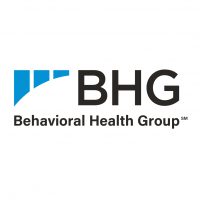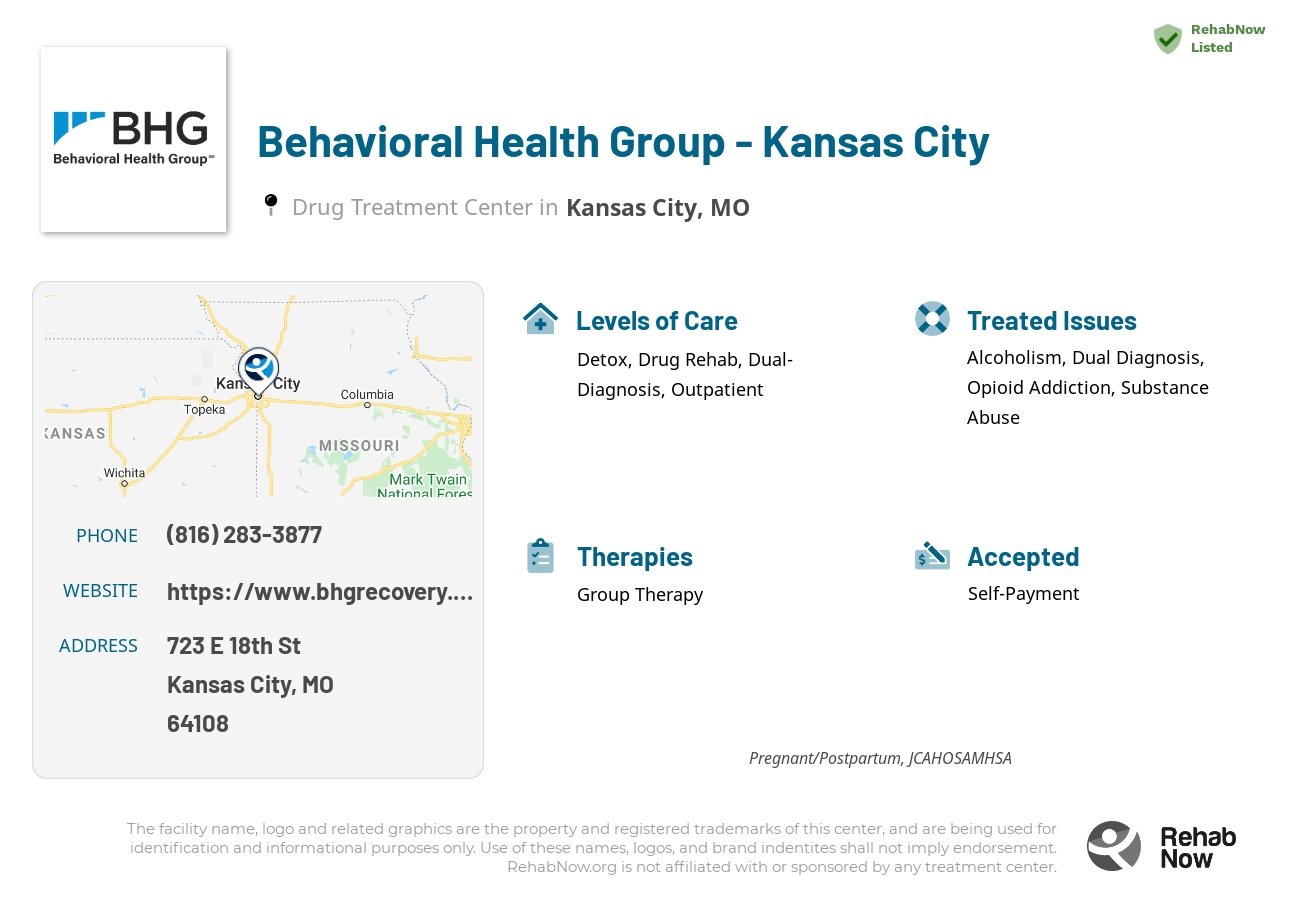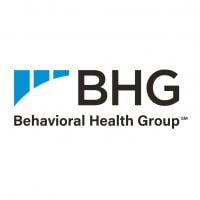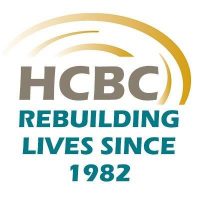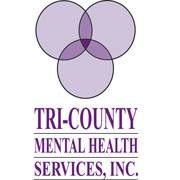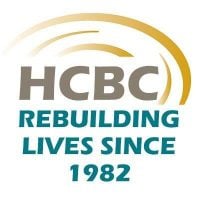Behavioral Health Group - Kansas City
Drug Rehab Center in Kansas City, Missouri
Behavioral Health Group - Kansas City (BHGKC) in Kansas City, Missouri, offers comprehensive outpatient care for substance use disorders, mental/behavioral health issues, and dual diagnoses through medication-assisted treatment, therapy, and partial hospitalization programs, providing individualized treatment plans and evidence-based therapies to promote recovery and stability.
About Behavioral Health Group - Kansas City in Missouri
Behavioral Health Group in Kansas City, Missouri stands out as a comprehensive treatment center for individuals battling alcoholism, drug addiction, including opioid addiction, and dual diagnosis. Its mission emphasizes recovery's communal aspect, underscoring the importance of local care by knowledgeable professionals dedicated to helping patients every step of the way. What makes it unique is its commitment to both individual recovery and community education on addiction.
Holding reputable accreditations from LegitScript, SAMHSA, CARF, and JCAHO, Behavioral Health Group - Kansas City underscores its dedication to a standard of excellence in addiction and substance abuse treatment. These credentials affirm the center's effectiveness in delivering care that meets the highest industry standards. Accessibility is further enhanced through the acceptance of private health insurance.
- Comprehensive Care: Offers a wide spectrum of treatments from detox to outpatient care tailored to individual recovery paths.
- Focused Expertise: Specializes in addressing complex needs stemming from alcoholism, drug, and opioid addiction, as well as dual diagnosis.
- Community Integration: Aims to educate and integrate within the local community for a supportive recovery environment.
Behavioral Health Group - Kansas City treats an array of issues including alcoholism, opioid addiction, substance abuse, and dual diagnosis, employing a variety of treatment methods. From medically supervised detoxification to dual-diagnosis treatment, and outpatient care, the facility is equipped to offer multifaceted levels of care to promote lasting recovery.
Genders
Ages
Modality
Additional
Accreditations
SAMHSA

LegitScript

JCAHO

CARF
The Commission on Accreditation of Rehabilitation Facilities (CARF) is a non-profit organization that specifically accredits rehab organizations. Founded in 1966, CARF's, mission is to help service providers like rehab facilities maintain high standards of care.
Conditions and Issues Treated
Substance Abuse Treatment is important when getting sober, as it helps addicts learn the skills they need to live a clean life. There are many different kinds of recovery treatment, including but not limited to medication-assisted therapy, behavioral therapeutic approaches, self-help groups, and counseling. Each treatment has its benefits that help addicts recover.
Counseling can help addicts learn the skills they need to live sober lives. It can be used to treat underlying mental health issues, like depression or anxiety, that could lead to relapse. Counseling can also help people find work, deal with family problems, and learn to manage living without drugs.
With so many people addicted to opioids, we need to help those who want to quit. The cycle begins when opioid addicts take opioids for a painful injury. When someone starts taking their medication differently or in excess, it means they’re addicted and at risk of overdosing.
In , detoxing from these types of treatments is the most effective way to beat this. Most facilities begin with medical assistance and then provide counseling services; rehabilitation follows after successful treatment.
Dual diagnosis refers to someone who has both an addiction and a mental or emotional illness. Dual diagnosis treatment includes therapy for both issues simultaneously, allowing for effective treatment of either.
Sometimes people with addiction disorders also have co-occurring disorders like depression, anxiety, bipolar disorder, etc. These require specialized treatment programs that address both drug and alcohol addiction as well as psychiatric illnesses. Some rehabilitation facilities provide patients with co-occurring disorders a program with highly integrated services and a clean, distraction-free environment.
Levels of Care Offered
This center offers a variety of custom treatment tailored to individual recovery. Currently available are Detox, Drug Rehab, Dual-Diagnosis, Outpatient, with additional therapies available as listed below.
Detox is an integral part of recovery and often very hard. Detoxification is the process of letting the body remove the drugs in it. It addresses the physical aspect of addiction. Detox from drugs can be unsafe as the patient undergoes withdrawal symptoms that range from headaches, vomiting, body aches to seizures and cardiac arrests. The main purpose of detox is to keep the drug users comfortable as the drugs leave their system.
Quitting cold turkey is not recommended and can lead to many issues. Detox is best done under medical supervision so that a team of experts can monitor the side effects and complications. Detox, alone, does not guarantee sobriety as the underlying psychological issues are not addressed.
Alcohol or drug addiction, or co-occurring disorders, are treated in an outpatient program. The patient must attend therapy and other programs at the facility but can return home each night.
Outpatient treatment allows recovering addicts to live at home while receiving addiction treatment. Outpatients can attend group sessions for a few hours per week. Outpatients may also continue to work full time and study/attend school without interruption if they choose.
Therapies & Programs
Attending group therapy at Behavioral Health Group - Kansas City in , is a useful way for those seeking sobriety to realize they aren’t the only one going through it.
This is when a group of people on different recovery phases get together and talk about what they’re going through, their triggers, successes, and failures. This can include alternative types of therapies too! Group therapy may occur on an outpatient or inpatient basis with groups that have no pre-existing relationships outside the session, unlike support groups where everyone already knows each other beforehand.
Payment Options Accepted
For specific insurance or payment methods please contact us.
Behavioral Health Group – Missouri Associated Centers
Discover treatment facilities under the same provider.
- Behavioral Health Group - West Plains in West Plains, MO
- Behavioral Health Group - Poplar Bluff in Poplar Bluff, MO
- Behavioral Health Group - Columbia in Columbia, MO
Learn More About Behavioral Health Group – Missouri Centers
Additional Details
Specifics, location, and helpful extra information.
Kansas City, Missouri 64108 Phone Number(816) 283-3877 Meta DetailsUpdated April 15, 2024
Staff Verified
Is Behavioral Health Group – Kansas City a LegitScript Verified Treatment Facility?
According to our most recent records, we have found this center to be LegitScript verified.
Behavioral Health Group - Kansas City Patient Reviews
There are no reviews yet. Be the first one to write one.
Kansas City, Missouri Addiction Information
Opioid-related overdoses in Missouri have been increasing steadily for the past three decades. In 2018, more than 1,130 people in Missouri died from opioid abuse. Methamphetamines and marijuana abuse have surpassed opioid abuse in Missouri. Missouri is the number 1 methamphetamine manufacturer in the country with more than 27 meth labs per 100,000 people.
In Kansas City, Missouri, in 2016, there were 97 drug overdose deaths. There were 438 drug-related deaths in Kansas City in 2017, and that number is expected to rise in 2018. Drug addiction not only takes a toll on the individual but the entire community. Kansas City, MO, offers various drug treatment options for those looking to get sober. People who require around-the-clock assistance can enroll in these programs.
Treatment in Nearby Cities
- Lebanon, MO (142.3 mi.)
- Cuba, MO (185.6 mi.)
- New Madrid, MO (325.5 mi.)
- Kirksville, MO (130.7 mi.)
- Arnold, MO (230.6 mi.)
Centers near Behavioral Health Group - Kansas City
The facility name, logo and brand are the property and registered trademarks of Behavioral Health Group - Kansas City, and are being used for identification and informational purposes only. Use of these names, logos and brands shall not imply endorsement. RehabNow.org is not affiliated with or sponsored by Behavioral Health Group - Kansas City.
